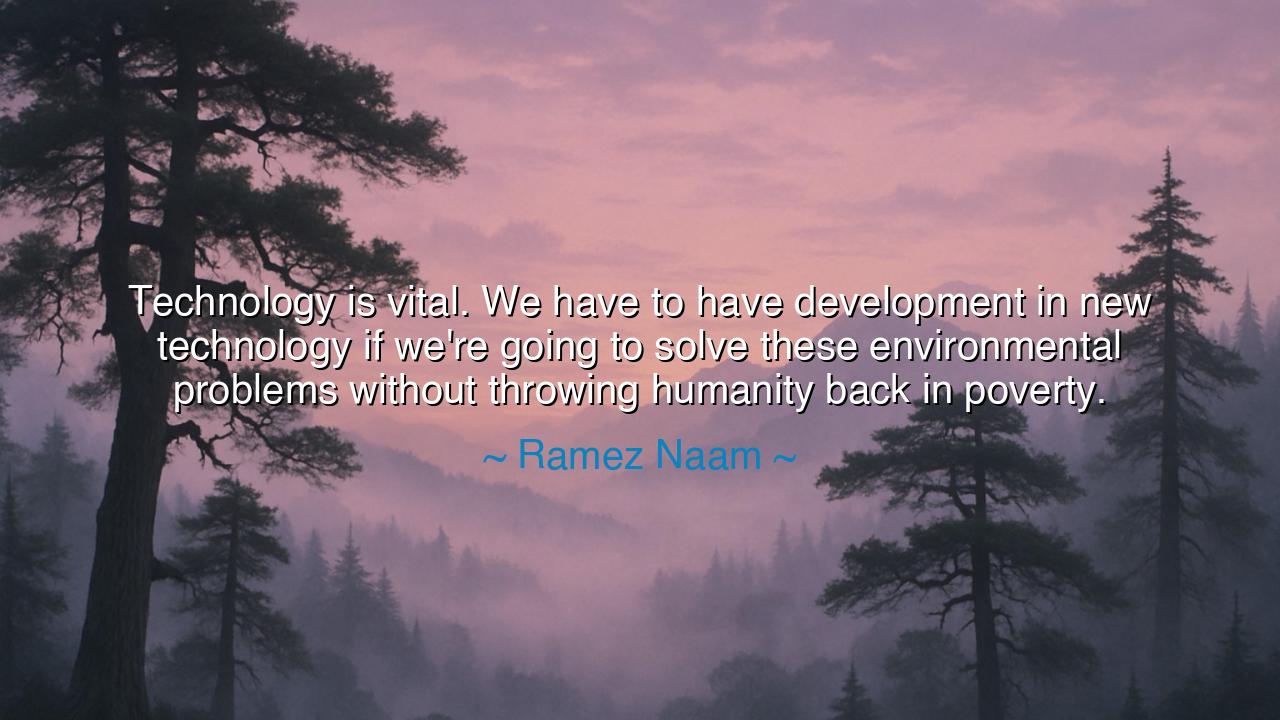
Technology is vital. We have to have development in new
Technology is vital. We have to have development in new technology if we're going to solve these environmental problems without throwing humanity back in poverty.






In the chronicles of human endeavor, few forces have shaped the destiny of our species as profoundly as the march of technology. Ramez Naam reflects with both urgency and foresight: “**Technology is vital. We have to have development in new technology if we're going to solve these environmental problems without throwing humanity back in poverty.” In these words lies a solemn truth, one that the ancients would recognize: that progress, when guided by wisdom, holds the power to safeguard life, yet if neglected, threatens to undo the labors of generations.
Long ago, the sages of China and Greece understood that human innovation was both a blessing and a burden. The irrigation systems of Mesopotamia, the aqueducts of Rome, and the mechanical wonders of Alexandria were born from necessity, yet they demanded foresight, discipline, and care. In Ramez Naam’s reflection, technology is the modern equivalent of these ancient marvels—a tool by which humanity may bend the forces of nature toward preservation, not destruction, ensuring survival without sacrificing prosperity.
History offers a vivid lesson in the balance between progress and preservation. The Industrial Revolution brought unparalleled wealth, mobility, and knowledge, yet it also unleashed pollution, deforestation, and human suffering. Cities choked on smoke, rivers ran black, and countless souls suffered under the weight of ambition untempered by conscience. It is here that Naam’s warning resonates: solutions to environmental problems must harness technology in harmony with human welfare, lest advancement itself become the instrument of ruin.
Consider the example of renewable energy today. Solar, wind, and battery technologies provide a means to power civilizations without further devastating the earth. Countries that invest in these innovations—Germany, Denmark, and China among them—demonstrate that development in new technology can protect the environment while sustaining economic growth. The lesson mirrors the wisdom of the ancients: ingenuity must serve the collective good, balancing human needs with the preservation of the world upon which all life depends.
Naam’s insight also reminds us that progress is inseparable from responsibility. To neglect technology is to risk both environmental collapse and the impoverishment of millions. Conversely, to invest in human ingenuity is to safeguard livelihoods, prevent famine, and nurture prosperity across continents. Just as the ancient engineers built bridges and aqueducts to sustain cities, modern innovators must construct systems that harmonize energy, ecology, and economy—bridges of intellect connecting today’s challenges with tomorrow’s hope.
The lesson is both practical and moral: we must prioritize learning, innovation, and collaboration. Scientists, engineers, and citizens alike bear responsibility to develop solutions that reduce emissions, conserve resources, and create sustainable wealth. Even individual actions—supporting clean energy, advocating for policy change, or fostering scientific literacy—contribute to a larger movement capable of steering humanity toward safety and abundance.
In contemplating Naam’s words, we perceive the ancient principle that guided civilizations long past: foresight is the guardian of life. Progress, without wisdom, invites catastrophe; progress, aligned with conscience, secures survival and prosperity. The development of new technology is not a mere convenience—it is a moral imperative, a covenant between the present and future generations, ensuring that humanity may thrive without forsaking the earth.
Thus, let this teaching resonate through the ages: technology is vital, not as a means of vanity or dominance, but as a bridge to a sustainable world. Innovate boldly, act wisely, and remember that the fruits of intellect carry a sacred responsibility. To harness invention for the good of all, preserving the earth while sustaining prosperity, is the legacy we owe to those who will inherit the world after us.
I can also craft a more oral, epic version of this, emphasizing cadence, rises and falls in rhetoric, and vivid imagery, making it feel like a timeless teaching for narration or meditation. Do you want me to create that version?






AAdministratorAdministrator
Welcome, honored guests. Please leave a comment, we will respond soon